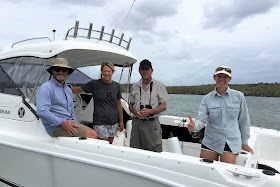 |
| Kentish Plover |
It's been a good week for twitching around the Sunshine Coast.
Jane Cooksley made a fantastic discovery late yesterday afternoon
when she found a Kentish Plover at Noosa. The bird was on a sandflat in the Noosa River about 1.5km upstream from the river mouth at low
tide opposite Noosa River Holiday Park at Munna Point. The Noosa River has had its
share of rarities in the past, including Queensland's only Hooded
Plover.
 |
| Kentish Plover |
Jane and her hubby Andrew had been walking the sandflats after
disembarking from the family dinghy. Jane and Andrew kindly offered
to take Carolyn Scott and I out today in an upgraded family boat!
With a king high tide scheduled for 8am and the river sandflats under
water, the initial plan was to head out in the afternoon at low tide.
However, Andy Jensen spotted the bird early this morning from the
river's south bank; it was distantly on a sandbar on what was almost
certainly the island that hosts nesting Beach Stone-Curlews.
 |
| Kentish Plover |
So we opted for an early morning high tide search instead. We landed on the island but no Kentish Plover, just a couple of
Red-capped Plovers and loads of terns. Then Rob Morris subsequently saw the bird close
to the river mouth (the joys of Facebook instant messaging) so we
headed to the north shore and disembarked; it's likely the plover and other birds had been flushed from the island by a visiting kayaker. Carolyn spotted the
plover along the high tide line. The bird was associating loosely with a
flock of about 20 Red-capped Plovers and was immediately very
different in appearance.
 |
| Kentish Plover & Red-capped Plover |
The north shore can be accessed by road after crossing the Noosa
River by vehicular ferry at Tewantin. Non-4WD vehicles can drive to
the end of Esplanade/Flying Fish Track/Wilderness Track (called
various things on different maps), which runs along the river's north
shore off Beach Road. Vehicles can be left in the bush there and you
can walk 1km to the river mouth. We saw the bird at high tide. If it
moves back into the river as the tide recedes, you can generally walk the
sandflats at low tide, although they cover an extensive area. Sometimes low tide is not particularly low, in which case a boat would be needed to access the sandflats. Or you can be satisfied with more distant views from shore.
 |
| Successful plover twitch (Andrew & Jane Cooksley, Greg Roberts, Carolyn Scott) |
Last Tuesday, Helen Leonard found an (Asian) Gull-billed Tern at
the Toorbul high tide shorebird roost. This species,
affinis,
was split recently from what is now known as the Australian
(Gull-billed) Tern
macrotarsa. I looked for the bird without
success at Toorbul on Wednesday but found an Asian Gull-billed Tern
hawking the mudflats of Godwin Beach on a receding tide later during
the day.
 |
| Asian Gull-billed Tern |
 |
| Asian Gull-billed Tern |
Later in the week, Helen photographed an Asian Gull-billed Tern at
the shorebird high tide roost of Kakadu on Bribie Island. It's likely
these three sightings are of the same bird. It is possibly the
same bird that has been seen several times in recent weeks in the
Pine Rivers area a little further south. While not of the same
vintage as a Kentish Plover, this is another scarce visitor to these
shores from distant lands.
 |
| Asian Gull-billed Tern |
 |
| Asian Gull-billed Tern |









nice post
ReplyDelete